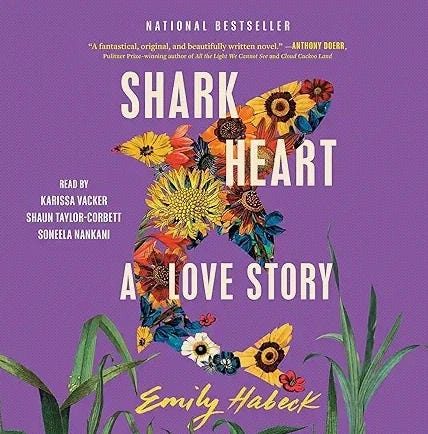BookLife Review by Carol O’Day: Shark Heart, A Love Story (Emily Habeck, author)
Magical realism, love story, metamorphosis, cross-species transfiguration, unconditional love, forgiveness, letting go, sharks, Komodo dragons.
Emily Habeck’s debut novel, Shark Heart: A Love Story, is the admittedly odd story of the love between Wren and Lewis; it is a refection of sorts on the nature of genuine and unconditional love, especially where the boundaries of life and fantasy blur. Wren is a young woman who likes structure and order and eschews public, and even sometimes private, displays of emotion. On an unsuccessful first date she spies Lewis at another table; Lewis simultaneously notices Wren and follows her to give her his number. Lewis is a wannabe actor and a high school drama teacher who wears his heart more or less on his sleeve. Despite the stark differences in their personalities and temperaments, Wren and Lewis fall in love. They are married for less than one year when Lewis develops troubling physical symptoms. He notices a softening of the cartilage in his nose and a general malaise and weakness.
When Lewis receives his diagnosis, he experiences sadness; the reader does a double take and then crosses the rainbow bridge from reality into a surprising realistic fantasy when his diagnosis is revealed. In Wren and Lewis’ world, the possibility that one may carry genes that cause them to morph gradually into another species, while troubling and tragic, is not unheard of, or even uncommon. Lewis learns that he will, within a short period of time, transform completely into a Great White Shark. He will retain some, if not all, of his mental and intellectual consciousness, but not his full intellect. The process will be gradual but it is neither curable nor reversible.
When Wren learns of her husband’s diagnosis, she is understandably devastated, and yet at the same time remains determined to find ways for the two of them to continue to cohabitate during his transformation and later to visit and commune with one another. She takes practical steps to outfit their home to accommodate his special needs, from his need for immersion in water to his changing appetite and carnivorous outbursts. As the story unfolds we learn that Wren comes by her equanimity in the face of her husband’s life-altering (and human terminus) condition honestly. When Wren was a teenager, her single mother was diagnosed with a gene that would convert her to a dangerous Komodo dragon, a condition that required that the reptilian version of her mother would need to be either be released into the wild or be euthanized. Wren cared for her beloved mother until her death.
As with much magical realism works, enjoyment of Habeck’s novel requires the reader to suspend belief and proceed on a what-if or as-if basis. It is not difficult to equate the premise of this novel to a love story in which a couple is confronted with what unconditional love truly requires and test their capacities for generosity, commitment, and forgiveness.
Wren must decide whether to hold on to Lewis as a Great White or release him into his new natural oceanic habitat. She must face her grief, as well as her lingering grief over the loss of her mother. She must decide if she can move through and forward and forge a new normal for herself.
Is this not true of anyone who suffers the gradual or sudden loss of a loved one? Whether it is a year into a marriage, a couple of decades into parenthood, or in the injustices of old age or dementia, is anyone really ever prepared to face the decline in health or loss of conscious memory of a beloved partner, parent or child? Habeck does us a favor by painting the issue so large and fantastically that we cannot help but see the parallels and face the hard questions ourselves. If conditions were such that cross-species metamorphosis were as common as cancer diagnoses, how would each of us face such a life-altering change? We would be capable of summoning a measure of grace, generosity and unconditional love we never anticipated we even possessed? Does this answer or raise questions we each will confront in our very real, very human, very fragile lives. It is certainly cause for meditation, or perhaps even a dive into the ocean or a visit to the zoo.
Support BookLife: Reviews for Readers and independent book stores by purchasing Shark Heart, A Love Story using the links below:





